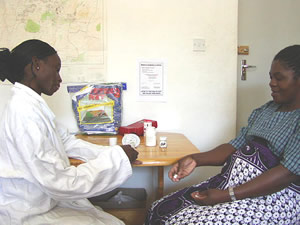Recently published in eBioMedicine, this study represents the work of the late Professor Steve Meshnick who served as mentor to Andreea Waltmann, a postdoctoral scholar with the Institute for Global Health & Infectious Diseases. Dr. Meshnick died August 5, 2020.
Malaria in pregnancy (MiP) is a major public health problem with substantial risks for mothers and their babies. The combination treatment sulfadoxine-pyrimethamine (SP), given for intermittent preventive therapy of malaria in pregnancy (IPTp), is one of the few existing interventions that improve outcomes for both mother and baby, despite widespread SP-resistant malaria. Compelling evidence has shown malaria-independent pathways contribute to the protective effects, but how non-malaria pathways provide protection is not known.
Origins of the study

A study conceptualized by the late Steve Meshnick, MD, PhD, professor of epidemiology at the UNC Gillings School of Global Public Health and member of the UNC Institute for Global Health and Infectious Diseases (IGHID), who partnered with the CDC’s Julie Gutman to make it a reality, considered how the beneficial effects of SP on birthweight could be mediated by SP activity on maternal factors, such as maternal weight gain during pregnancy, influenced by intestinal pathogens.
Postdoctoral IGHID scholar Andreea Waltmann, PhD, with IDEEL, conducted the work under the mentorship of Professor Meshnick. She describes the study’s high public health significance, published in eBioMedicine, and says malaria in pregnancy was a field of research dear to Meshnick’s heart.
“Malaria parasites resistant to SP are now common, bringing into question whether SP therapy in pregnancy should be discontinued,” Waltmann said. “Paradoxically, SP’s positive effects of reduced maternal anemia and improved birthweight have not diminished in areas with high rates of SP-resistant malaria parasites.
“Our study is the first step in elucidating that the observed benefits of SP on pregnant women and their babies is mediated by a promotion of maternal weight gain during the second and third trimesters of pregnancy. In addition, our results indicate that this positive weight gain-promoting effect is lessened if intestinal pathogens are detected in the mother’s stool prior to IPTp initiation, which in turn may influence birthweight.”
Recruiting pregnant women

The randomized controlled trial and sub-study recruited pregnant women between 16- and 28-weeks gestational age attending their first antenatal care visit at Machinga District Hospital in Malawi. Participants received a monthly preventative treatment of either sulfadoxine-pyrimethamine (SP) or dihydroartemisinin-piperaquine (DP). In addition to measuring body weights, the sub-study collected monthly stool samples and screened them for common enteric pathogens using previously validated molecular assays. Women with high-risk pregnancies or other medical conditions were excluded. Findings showed IPTp-SP vs. IPTp-DP was consistently associated with higher nutritional indicators, such as body-mass index and gestational weight gain, after at least three doses of SP, as per the recommendation of the World Health Organization. The presence of maternal gut pathogens before initiation of IPTp lessened this effect. Overall, the study in the context of all available evidence indicated SP therapy in pregnancy has additional, malaria-independent benefits to both mother and baby via the promotion of gestational weight gain. Preventing common intestinal pathogens in the pregnant mother may be an additional intervention opportunity for optimal gestational weight gain and birthweight.
“Further studies are needed to confirm the generalizability of these findings outside of Malawi, but they do offer an innovative and exciting perspective on how we may be able to intervene during the prenatal period to ensure the health of both mother and baby, since a newborn’s ability to thrive is closely linked to maternal health,” explained Waltmann.
“While we didn’t get a chance to publish this paper before his untimely passing, I remember how excited he was when I shared with him the results of my analysis, which unexpectedly and for the first time in our field showed that SP has a positive effect on baby birthweight by promoting his or her mother’s weight gain during pregnancy,” said Waltmann. “I hope that if he were still with us, he’d feel as proud of this paper as I do.”
The study team also included include Elizabeth T. Rogawski McQuade; Jobiba Chinkhumba; Darwin J.Operario; Enala Mzembe; Megumi Itoh; Michael Kayange; Sydney M. Puerto-Meredith; Don P. Mathanga; Jonathan J. Juliano; Ian Carroll; and Luther A. Bartelt.
